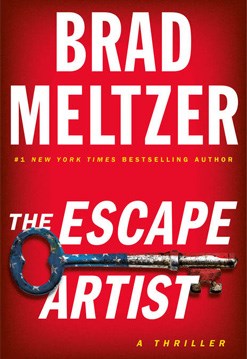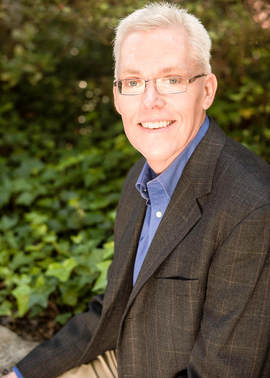 I received a complimentary copy of The Escape Artist from Grand Central Publishing in an exchange for an honest review of its merits. One of the nice thing about your favorite authors is that when you pick up a copy of their latest work you pretty much know what you are getting. Sue Grafton gave us detective stories, John Grisham (with a couple notable exceptions) spins a good legal tale, Kristin Hannah is going to dig deep into your soul and make you yell or cry, or both. Nicolas Sparks will tell you of uncommon love and the characters in a Joel Green novel are nigh unto bursting with angst. And Brad Meltzer is the name you look for when you want a really good mystery about hidden secrets but you don't want to say up for days questioning all of human history. If that’s what you want, you knock on Dan Brown’s door. Meltzer has become the go-to guy for a fun, fast-paced thriller that most often includes people searching for obscure clues about an ancient mystery. But in the acknowledgements of The Escape Artist, Meltzer tells you something profound happened to him when he was touring with the USO six years ago make him “realize the difference between being alive and actually living.” While this sounds like fortune-cookie wisdom, it is much more than that for this best-selling author. Meltzer is a changed man and it shows in his writing. Don’t get me wrong. He’s not waxing poetic about the banality of the human condition or anything. There is definitely the thrill and mystery that is coded into the DNA of any Brad Meltzer title. But that’s not all that’s there. In The Escape Artist, the mystery in this tale takes a backseat to character development. Nola and Zig are deeply wounded people and we spend a lot of time in their skin watching new bumps and bruises being added atop the old scars that may be faded but still are tender to the touch. Some of the scratches are on the surface, but others cut much deeper. And while Meltzer respected the source material for his earlier stories, there is a reverence here for the heart-wrenching pain and heart-warming honor that comes with caring for those who have given the ultimate sacrifice in defense of our nation. So, by the time the actual mystery is fully fleshed out deep in the third act, you’re not really bothered by the fact because you’ve been drawn into the story of these two people who’ve been drawn together by fate more than once. In this work, Meltzer’s storytelling prowess is transformed into something altogether new. He is deeper and more introspective than he has been before. I’m not sure if his next tale will take us back to familiar territory of long-forgotten secrets and stashes of hidden wealth, but I, for one, am hopeful that Meltzer is speaking of himself when his protagonist realizes that “[s]ometimes you need to bury your old life—and make a new one.”
0 Comments
 Joseph Bentz is living a writer's dream life. He's a full-time English professor, novelist and non-fiction writer. In his spare time, he teaches at writers conferences around the country and co-leads a "support group" of sorts for fellow creatives trying to deal with all the challenges and joys that come with sharing their work with the world. When did you first realize you were a storyteller? I know I was writing stories at least as far back as fifth grade because I have found a few of those stories in a box in my garage. I may have started writing stories even earlier. By the time I was in high school, I knew I wanted to write a novel, and I started working on one at a more serious level in college. I still had years of work ahead because my first novel, Song of Fire, wasn’t published until I was 34 years old. What do you love about the writing process? The magic of writing is that a story or idea that at one point exists only in my own head can be placed into the heads of other people, many of whom I will never know. The events and people in my novels become “real” to me, and I love the fact that readers can know those people and that story too. I know those readers won’t see the story exactly the way I do, but I like that too, the idea that there many versions of the story flowing through other people’s brains. My novel A Son Comes Home is sometimes taught in literature courses where I am asked to speak, and I love to hear the impressions of readers to see how their ideas are similar and different from my own understanding of what I have written. With nonfiction, part of what I love about the writing process is that writing is a way of figuring things out or thinking through things. My books on Christian living issues, such as When God Takes Too Long or Nothing is Wasted, start out as questions I have in my own life. Writing a book about them gives me the chance to dig deeper into those issues and try to make sense of them for myself and others. What is the hardest part of being a writer? The hardest part keeps changing. At certain points in my writing career, discipline has been the hardest part. I had the desire to write, but I had trouble sticking to it hour after hour, day after day, until a project was finished. Self-doubt and insecurity have also been big enemies. Another hard part is trying to translate the ideas that seem so beautiful in my head to actual words on the page that will be meaningful to other people. It’s often hard to find the words to fit the idea. Where do you find your inspiration? Coffee. Lots of it. Music has also been a big inspiration, especially for my early novels. I don’t like to listen to music during my writing time, but listening to music before and after writing can unleash a flood of ideas. The ideas can’t be tied to the music itself in any logical way, but music somehow stimulates the creative flow. Other writers are also a big inspiration. Whenever I read something, I often have to stop and take notes on ideas that have been sparked for one of my own projects. What are you working on right now? I am working on a book about passages from the Bible that have changed the world. Even if you have never opened a Bible, you would still know what the “prodigal son” refers to or what a “good Samaritan” is. I want to examine why some of these passages have been so influential and also look at some ways they have been misunderstood. This book will focus on portions of the New Testament, and my next book will be about the Old Testament. I have a deadline of March 15, and the book should come out later this year. It will be published by Beacon Hill Press, which has changed its name to The Foundry Publishing. They have published several of my books. To keep up with Joseph and his latest projects, check out his website and his blog, Life of the Mind and Soul.  Creative Commons Image by Ashley Adcox Creative Commons Image by Ashley Adcox Whenever I tell people I'm an indie novelist, they often seem amazed I can write and publish a book-length manuscript. One lesson I have learned over the years is that the hardest part of wordsmithing a book is not the 50,000—60,000 or so words on the inside, but the 5—6 words on the cover. Book titles are so challenging because you have so little space to get so much right (or wrong as the case may be). You want action, suspense and mystery, all in a handful of syllables. If I execute a poorly crafted sentence or section of a novel I can recover. The same often is not true for a title. Teasing your story without giving it all away seems to be the key to a great title. Sadistic Businessman Seduces College Co-ed sounds like a Dateline Mystery, Fifty Shades of Gray, on the other hand, is a bit more enticing (BTW, I'm crediting Wikipedia with the plot summary of this film, as I'm more inclined to spend an evening with Earl Grey than Christian Gray). The same holds true for Psycho Dinosaurs Run Wild, as opposed to Jurassic Park. I wish I had a great story behind how my first novel was christened. Its first title was "A Matter of Integrity", which was way too on the nose. "Above the Fold" was better, but the inside-the-newsroom jargon didn't weather much better. My then-agent suggested I take some key phrases and put them together. So I made a list, started joining nouns and verbs together. And thus was born Chasing Deception. Other book titles came a bit more naturally. The second book in the Jim Mitchell series, Undue Pressure, is applicable to anyone placed in a morally murky situation and expected to do the right thing. And Running wraps up the Mitchell series by talking about what the protagonist is running toward and running from and whether he can stop and just rest. The easiest and best title for one of my works was for my non-fiction parenting guide — High School Declassified: An Insider's Guide to Helping Your Student Succeed. It was catchy and had all the buzzwords. Unfortunately, it sold practically zero copies, which just goes to show there are many factors beyond title and content that can impact sales. Now if I could create a computer program that could "read" a manuscript and suggest the perfect title based upon content and recent market trends, I could probably make a lot more money than my indie writing career ever will. Then again, what fun would that be. |
AuthorI've been writing stories and taking photos since I was old enough to hold a pencil and stand behind a tripod. Archives
February 2024
Categories
All
|
 RSS Feed
RSS Feed